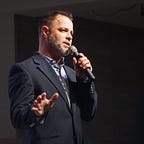Independent Dependence
In the history of our great nation the Church has often romanticized and sanitized the narrative of our country’s founding, making it seem as though our beginning was one of a homogenous and harmonious process involving mostly Christians, resulting in a “Christian” nation; often ignoring factious elements of early America and schisms that even “infected” the periods of both Great Awakenings.
The reality is that what led our forefather’s to move from loyal subjects, to dissenting objectors, to active revolutionaries — resulting in the birth of the. “American experiment”, as it has been called — was far more complex and messy than we often admit.
On the other hand, in recent decades , woke ideologues have sought to revise the American story espousing a view that mutes the influences of the Christian gospel on our founding, or if it treats them at all, mocks the ideals and beliefs of our founding fathers as primitive, naive, and unenlightened, leaving an often even more untrue “revisionist history.”
As is often the case in such things, the truth likely lies somewhere between our “rose-colored” version and that of the culture in which we live.
In fact, those who picked up arms to free themselves from England’s tyranny included all manner of sects under the umbrella of “Christianity.” Some were deists or Unitarians, as well as those who were true believers in the Christian gospel — their surviving written words in speeches, diaries, and even sermons bear that out.
There were, in fact, multiple mind-sets about what this new nation should be like — how the influence of the Christian Scriptures and Christian expectations of behavior ought to shape it.
Those who were adherents to the biblical Gospel, sought not only a society governed by biblical principles, but what we could call an “independent dependance”. That is, they sought to be free from the tyranny of the mother nation — free to pursue a dependence on the Greater King, seeing themselves as citizens of a greater country. They saw the real power, not simply in living according to a set of values or principles, rather, in gospel transformation as key.
This 4th of July week let’s consider, for our own meditation, a couple of those who held this latter view — Roger Sherman and Patrick Henry.
Roger Sherman, who was a signer of both the Declaration of Independence and the Constitution — while lesser known than Patrick Henry — was explicit about his foundational beliefs:
“I believe that there is one only living and true God, existing in three persons, the Father, the Son, and the Holy Ghost, the same in substance equal in power and glory. That the scriptures of the old and new testaments are a revelation from God, and a complete rule to direct us how we may glorify and enjoy him.
…That he creates all things, and preserves and governs all creatures and all their actions…
I believe that God… did send his own Son to become man, die in the room and stead of sinners and thus to lay a foundation for the offer of pardon and salvation to all mankind, so as all may be saved who are willing to accept the gospel offer: also by his special grace and spirit, to regenerate, sanctify and enable to persevere in holiness, all who shall be saved; and to procure in consequence of their repentance and faith in himself their justification by virtue of his atonement as the only meritorious cause…”
(The Life of Roger Sherman, pp. 272–273)
Sherman, in this robust summary of Christian doctrine, makes clear his orthodoxy and love for the true Gospel, but Patrick Henry is more explicit about the Gospel’s impact on our founding…
“It cannot be emphasized too strongly or too often that this great nation was founded, not by religionists, but by Christians; not on religions, but on the gospel of Jesus Christ. For this very reason peoples of other faiths have been afforded asylum, prosperity, and freedom of worship here.”
(The Trumpet Voice of Freedom: Patrick Henry of Virginia, p. iii)
Patrick Henry saw our budding “American experiment” as in fact a Christian nation. While that is somewhat dependent on our definition, clearly he understood that it was the Gospel itself, and not religious laws and principles designed to govern behavior, that undergirded our founding. Henry believed that it was a commitment to Gospel fidelity that was the foundation of religious freedom, and freedom, it is worth noting, for those of all faiths.
So, this Independence Day, let’s remember that although our founding was imperfect and messy, we owe tremendous debt to the foresight of those who sought independence of thought, belief, and practice of faith, and we should be grateful for a free society — as long as it remains to be so.
But lets also not over-idealize what America was, is, or can be, rather, as believers, have our sights set on that “better country” to which we truly belong, and dependence on the One to Whom our ultimate allegiance is due!
Happy 4th everyone! — Pastor Gary
